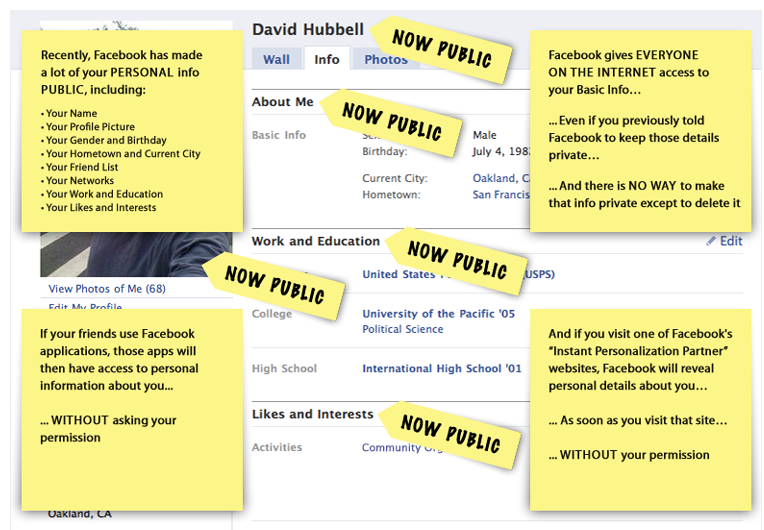 When Facebook launched their Open Graph API last month they thought they had revolutionized their platform. They certainly did not expect some of its own users to organize international boycotts like Quit Facebook Day or petitions by some of the largest grassroots organizations like MoveOn and the ACLU. But Facebook crossed a privacy line again and has infuriated some of its most passionate users.
When Facebook launched their Open Graph API last month they thought they had revolutionized their platform. They certainly did not expect some of its own users to organize international boycotts like Quit Facebook Day or petitions by some of the largest grassroots organizations like MoveOn and the ACLU. But Facebook crossed a privacy line again and has infuriated some of its most passionate users.
Has Facebook angered its base so much, that its user base could fizzle out in the next year as more people and nonprofits demand control of their own social data and look to other platforms? In March, Facebook had more traffic than Google in the US. Also what impact does Facebook’s new privacy policies have on nonprofits and their constituents?
“Facebook is really good at handling stuff like this-- they've gone through a privacy coup before,” said Clay Johnson, Director of Sunlight Labs for the Sunlight Foundation. “I think Facebook has been having a negotiation with the public for where the right space lies between the ability to share data and the need for people to protect their privacy. This negotiation is being done through innovation rather than dialog-- probably the only way it can happen. It'll sort itself out soon enough. But Facebook's too baked into everywhere for it to go away or for a user revolt to be practically useful.”
Jon Pincus who co-chairs the Computer, Freedom and Privacy Conference, says that that there's a need for a social graph that's not tied to a particular website or corporation. Frogloop explored this concept last fall when we discussed “Is your Nonprofit too Social Media Dependent?” 
What is the Portable Social Graph?
“The "social graph" is, basically, your data about who you are, and who is connected to you - who your friends are. A portable social graph would be one that you can take with you, wherever you are - so the friends that are connected with you on one network are also connected with you on another. It's the holy grail of social network connectivity - you are connected to who you are connected to, no matter what site you are on”, said Michelle Murrain of Open Issue.
Portability's one approach; another is to put the social graph under an individual's control from the beginning which Diaspora, a new open source social network being built by a few NYU college students is attempting. In the past couple of weeks, these college students have raised over $100K, mainly in response to the revolt against Facebook’s privacy policy.
“Judging by the reaction Diaspora received at their plans to let people control their own privacy while empowering them with a social graph, I’d say there is definitely a need for the technology and convenience of it,” said Danielle Brigida, who runs social media for the National Wildlife Federation. “I’m interested to see what they will do with it next. From a nonprofit perspective how we can use that information (that our constituents want us to have) to better serve the communities and the world.”
Others are not fans of projects like Diaspora because they think you can achieve similar results through email. “Ultimately, building a service that allows people to share content with their friends in an easy, secure way with content that you can control sounds, to me, a lot like email. So if you want a good, portable, distributed social graph... open up your address book,” said Johnson.
The Impact of Facebook’s New Privacy Policies on Nonprofits and their Constituents
Nonprofits and political campaigns should certainly be aware of the issues, said Pincus. “With the latest changes, it's very easy for campaign supporters to inadvertently reveal information about their activities and interests, and some situations that can put them at risk. So it may well be important to provide basic educational information for volunteers and supporters.”
http://reclaimprivacy.org is one utility that constituents can check out.
“In terms of tactics, again, it really comes down to awareness is important. Putting a "like" button on your web page is a great opportunity to get some viral awareness on Facebook ... but what percentage of the people you're trying to reach out to will be concerned by the ramifications of having this information shared with Facebook and their partners and advertisers? The answer's likely to be different for different organizations,” said Pincus.
How do you feel about Facebook’s new privacy policies? Do you think nonprofits and their constituents would benefit from a portable social graph?
More Resources:
- Social Network ROI Calculator: Frogloop
You should follow Frogloop on Twitter.



COMMENTS